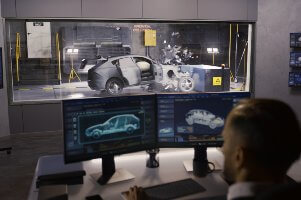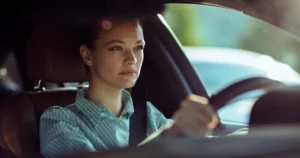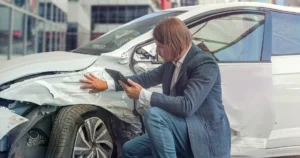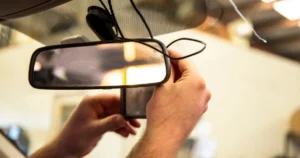
Drivers may feel safer in big cars like SUVs and pick-up trucks because they offer more protection. Does this mean smaller vehicles are not as safe?
Pfeifer, Morgan, and Stesiak answer these questions below, including what impact a car’s size has on a collision. We also discuss whether heavier cars really are safer and debunk common myths about the impact of a car’s size if a crash occurs.
Our South Bend car accident lawyers help injured car crash victims every day. We have been advocating for victims injured by the negligence of others for decades. Need legal help but unsure if you have a case? We can help by providing a free initial consultation. It is completely confidential and there is no obligation to move forward. If we represent you, there are no upfront costs or fees.
Call: (574) 444-0741 to request your FREE case review today.
Does Car Size Matter in a South Bend Collision?
There is no doubt that a car’s size is one factor that may contribute to the outcome of a car crash. The size and strength of larger vehicles inherently offer more protection to drivers and passengers due to several factors:
- The longer crumple zones extend the front ends, allowing more space to absorb impact before it reaches the passenger compartment.
- There is more mass to absorb the impact of a collision
- The higher ride height of a pickup truck, van or SUV reduces the risk of underride collisions
- Larger vehicles often have stronger frames and structures designed to withstand higher forces
- Many larger vehicles have advanced safety features, such as electronic stability control, to further protect vehicle occupants.
Are Small Cars More Likely to Crash?
Small cars are not necessarily more likely to crash, but they do have a higher fatality rate in a crash compared to larger vehicles. This may be caused by these reasons:
- Smaller cars can be harder for other drivers to see, especially in heavy traffic or adverse weather conditions
- Drivers in smaller vehicles are more vulnerable to aggressive drivers who tailgate or resort to other reckless driving behaviors, such as improper lane changes.
What Makes Small Cars Safer During an Accident?
While larger vehicles often have a safety advantage due to their mass, modern small cars may be safer for unexpected reasons, including:
- Easier to Maneuver: Smaller vehicles maneuver more easily, helping drivers respond more quickly to unexpected road hazards.
- Lower Center of Gravity: Smaller vehicles and compact cars have a lower center of gravity, which enhances stability and reduces rollover risks.
- Improved Visibility: Smaller cars generally have smaller blind spots, improving driver visibility and reaction time to avoid accidents.
Are Modern Small Cars Safer than Older Small Cars?
Modern vehicles are generally safer than older cars, regardless of their size. Modern small cars are designed with many high-tech safety features to better protect vehicle occupants.
Some of the most common safety features included in many newer model cars includes:
- Multiple airbags: Small cars often come equipped with a comprehensive airbag system, including front, side, and curtain airbags to protect occupants from various impact angles.
- High-Strength Materials: Many small cars use high-strength steel and other advanced materials in their construction, creating a rigid safety cage around occupants.
- Advanced Crumple Zones: Newer model small vehicles today have advanced crumple zones to better absorb and distribute crash energy, which better protects the passenger compartment.
- Electronic Stability Control (ESC): This technology helps drivers maintain control during sudden maneuvers, and is particularly beneficial in smaller, lighter vehicles.
- Forward Collision Warning: This safety feature alerts the driver about the risk of a potential collision with a vehicle or object ahead.
- Advanced Driver Assistance Systems (ADAS): Features like automatic emergency braking and lane departure warnings are increasingly common in small cars, helping to prevent accidents.
What Determines the Severity of a Car Crash?
Car size is a factor, but several other elements contribute to the severity of any crash, including:
- Speed at impact
- Collision angle
- Vehicle safety features
- Road conditions
- Driver and passenger seatbelt usage
- Airbag deployment
- Weather conditions
- Driver behaviors (distracted driving, fatigue, alcohol or drug impairment)
- Manufacturing defect
Are Heavier Cars Safer in a Crash?
Due to their greater mass and size, heavier cars inherently provide more protection in crashes. In a collision between a small car and a large SUV, the occupants of the larger vehicle are likely to experience fewer severe injuries and damages. However, it is important to know that even the occupants of larger vehicles can sustain severe injuries and damages when other factors, like speed, reckless driving behaviors and severe weather or road conditions, are involved.
Common Myths About Cars’ Size During a Crash
Several common myths exist about how the size of a vehicle impacts safety during an accident. For instance, individuals may think that heavier cars are better in all crashes. However, heavier and higher vehicles are more susceptible to single-vehicle accidents, such as rollovers.
Rollovers could lead to these types of accidents:
- Car tipping over when making a sharp turn
- Excessive speed
- When a car hits a pothole or a curb
- When cars have a narrower track width relative to their height
Another misconception is that all large cars are equally safe. This is not always the case. Larger trucks that are not properly maintained or are serviced with faulty manufacturing parts could contribute to a car crash.
Call Pfeifer, Morgan, and Stesiak After the Aftermath of a Crash
Regardless of your car’s size, if you have been involved in a South Bend car accident, it is essential to understand your rights and legal options. Our firm is committed to helping accident victims navigate the complex process of filing a claim and seeking fair compensation.
Our team at Pfeifer, Morgan and Stesiak has decades of experience and a proven track record of recovering millions for our clients. We are here to support you throughout the legal process.
Experienced Lawyers. Proven Results. Call: (574) 444-0741 today.












